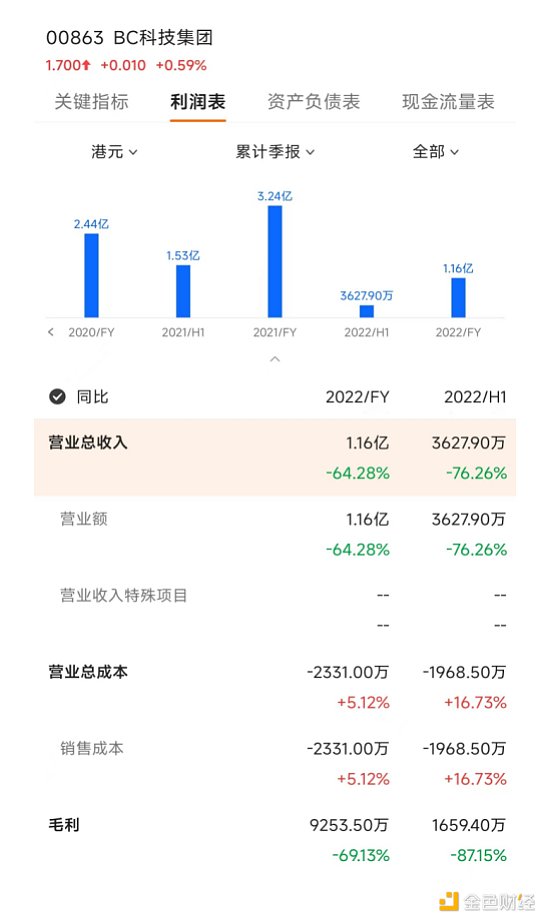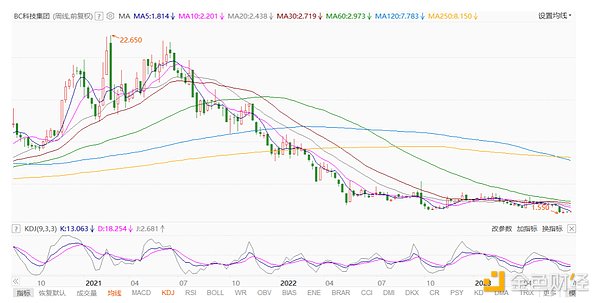Author: Blocking, Climber
On July 5th, Tencent News’ “Qian Wang” reported that the Hong Kong compliant virtual asset trading platform OSL has withdrawn from various institutions to seize the Hong Kong Web3 and compete for this emerging encrypted market. Moreover, as early as shortly after the end of the Spring Festival this year, the platform began to look for buyers who were interested in acquiring it in the market, but so far, no buyer has been found.
Contrary to rumors, OSL previously disclosed to the outside world that the platform has developed well this year, not only launching an artificial intelligence trading robot, but also applying for a Hong Kong digital asset retail trading license on June 1. OSL’s parent company, BC Technology CFO Hu Zhenbang, also stated that it will cooperate with some local brokers in Hong Kong to promote business for retail investors.
So, as the world’s first compliant virtual asset trading platform to obtain the Hong Kong Securities and Futures Commission’s issuance of Class 1 and 7 licenses, is OSL really no longer committed to deepening Hong Kong’s encrypted market trading service business, but is selling its existing business system and license to obtain market income to replenish its parent company’s blood? In addition, how much has the Hong Kong government increased its support for virtual asset trading platforms under the new license and market environment?
Below, Blocking will comprehensively sort out the possibilities of this event from the actual situation of all parties.
BC Technology Group
BC Technology Group Limited is an investment holding company mainly engaged in digital asset and blockchain platform businesses. In 2019, it was renamed “BC Technology” from “Brand China”, a Hong Kong-listed company. Since then, benefiting from the concept of blockchain and its digital asset trading platform OSL, BC Technology’s market value has been soaring.
However, due to the cryptocurrency winter in 2022, its latest financial report shows that BC Technology Group’s revenue in 2022 was 116 million Hong Kong dollars, a year-on-year decrease of 64.28%; net loss expanded to 550 million Hong Kong dollars. However, in early February this year, BC Technology Group issued a profit warning, stating that the net loss for 2021 was approximately HK$369 million.

In addition, the stock price of BC Technology Group has fallen all the way from its high point since February 2021 to the present. Especially after OSL announced the upgrade of its retail trading license, BC’s stock price has dropped to a historical low of around 1.55 Hong Kong dollars.

BC Technology Group’s continuous loss has also led to its third largest shareholder choosing to reduce its holdings. On June 19th, GIC Private Limited reduced its holdings of BC Technology Group by 197,500 shares at HKD 1.7519 per share.
Regarding the company’s loss situation, BC Group believes that the increase in net loss is mainly due to: losses incurred from maintaining digital assets to facilitate transactions in its normal course of digital asset trading business, and the increase in expenses related to the establishment of enterprise and technology infrastructure for compliant institutional-level digital asset business, including technology, legal and compliance, and insurance, among others.
Based on this, BC Group has completed two company-wide reorganizations in the second half of 2022 and the first half of 2023 to improve business efficiency. However, the company still expects operating costs to further decrease in the future.
The continuing poor revenue situation has deepened the idea of BC Group selling its OSL trading platform. Additionally, since BC Group’s executive director, Andy Cheung, has been dubbed the “King of Hong Kong Shells” and has extensive experience in “shell trading,” selling OSL again is considered a routine operation for him.
OSL Trading Platform
On December 15, 2020, BC Technology Group’s digital asset trading platform, OSL, obtained the first and seventh type of licenses under the regulatory framework of Hong Kong Securities and Futures Commission. OSL became the first digital asset trading platform of a listed parent company to obtain insurance coverage and be audited by the Big Four accounting firms in Hong Kong.
After the Hong Kong virtual asset new policy was officially implemented on June 1, 2022, OSL became one of the first encrypted platforms to apply for virtual asset retail trading business. For a long time, OSL was the only licensed and listed digital asset trading platform in Hong Kong.
Benefiting from compliance advantages, the platform has successively carried out business cooperation in the field of digital assets with traditional financial giants such as DBS Bank and Standard Chartered Bank, and has received an investment of HKD 543 million from the Singapore sovereign fund GIC.
However, like its parent company, its revenue situation is equally bad. In 2022, OSL’s cryptocurrency revenue was only HKD 71.48 million, less than one-third of the approximately HKD 270 million in the previous year.
Additionally, OSL exchange has also undergone multiple rounds of layoffs. In June of last year, the exchange laid off 40 to 60 people, accounting for about 15% of the total number of employees. In January of this year, Bloomberg reported that it was undergoing another round of layoffs, but refused to disclose the number, and also planned to cut about a third of its total costs.
In response, Hugh Madden, CEO of OSL’s parent company BC Technology Group, stated that the decision to cut costs was to respond to “current market conditions.” It can be seen that OSL’s operational situation is precarious and needs external help urgently.
Government regulation
In October 2022, the “Policy Statement on Virtual Asset Development in Hong Kong” was released. On December 7 of the same year, Hong Kong passed the latest revision of the “2022 Anti-Money Laundering and Counter-Terrorist Financing Ordinance”. This means that while the Hong Kong government is determined to develop virtual assets, it will also crack down on all kinds of encrypted trading behaviors in a strict manner.
The “Guidelines for Virtual Asset Trading Platform Operators” (VASP Guidelines), which officially came into effect on June 1 of this year, have made mandatory provisions for new and old licensed and pre-application compliant encryption practitioners. All centralized virtual asset exchanges that operate in Hong Kong or actively promote their services to Hong Kong investors, regardless of whether they provide security-type token trading services, must be licensed by the SFC and subject to its supervision.
The licensing application threshold has been raised, and the operating requirements have also been greatly increased. Against the background of the “mandatory licensing” system for VASPs, asset custody and exchange business cannot be separated, and OSL needs to provide guarantees for retail customers – including expanding existing cold and hot wallet facilities.
However, such operations require sufficient personnel, hardware, software, insurance, and auditing, and the higher the customer assets, the higher the cost. In addition, governments and audit firms will also verify on the blockchain network from time to time to ensure that these assets truly exist.
Therefore, it can be said that operating a cryptographic exchange in Hong Kong requires both high operating costs and high transparency supervision.
In addition, in order to comply with the requirements of the Hong Kong government, the cost of applying for a license is also very high. Two individuals who are trying to apply for an exchange license told the media that they expect the cost of applying for a license to be at least HKD 100 million before submitting the application, most of which is related to system technology requirements, in addition to management costs.
Market Environment
Regulatory authorities such as the Hong Kong Securities and Futures Commission and the Monetary Authority are actively promoting Hong Kong’s open attitude and policies towards the Web3 field, and actively inviting financial professionals in Hong Kong related to virtual assets to meet. Although companies registered to Hong Kong have landed in the Hong Kong Science and Technology Park with the support of government departments, they have not yet opened bank accounts.
Hong Kong plans to build an international virtual asset center, but the difficulty in opening bank accounts is still the primary problem faced by virtual asset companies in Hong Kong.
Ruan Guoheng, Vice President of the Hong Kong Monetary Authority, pointed out that there is no regulatory requirement prohibiting Hong Kong banks from providing banking services to virtual asset-related institutions.
Han Shanshan, CEO of a virtual asset company, said that in the past, virtual assets did not meet traditional bank authentication of collateral, financial audit and other factors, and Hong Kong banks were not friendly to startups.
Although the Hong Kong government has been pressuring Hong Kong banks to open accounts for encryption platforms, as of June this year, Hong Kong’s largest bank, HSBC, only allowed its customers to buy and sell virtual asset ETFs listed on the Hong Kong Stock Exchange. As for the news that Standard Chartered Bank has successfully opened an account for a Hong Kong exchange, it was only revealed by social media users.
In this regard, Hu Zhenbang stated that traditional banks have always been concerned about these encryption institutions, because they have not reached the standards of general securities companies and some banks in KYC, anti-money laundering, market monitoring, and whether customer assets are misappropriated.
From the perspective of the bank, it may not necessarily gain a lot of profits from these encryption institution customers, but it needs to face great risks, including compliance and monitoring costs required to carry out this business, so it is relatively conservative in accepting cryptocurrency-related customers.
Therefore, considering that traditional financial institutions still have not fully embraced cryptocurrency companies, it is even more difficult for virtual asset exchanges, which are already in a bear market, to make a profit.
Conclusion
Lily Z King, Chief Operating Officer of Cobo, revealed that in addition to OSL and Hash Blockchain Limited, there are currently 140 companies in the license application queue. However, the cost of license application and compliance operations is very expensive, “the annual operating cost may be around HKD 20 million, and the initial cost may be HKD 30 million to HKD 40 million.”
Therefore, as the fixed cost is already listed, and with strict regulatory regulations and poor market environment, it is not necessary to hold onto this hot potato in the case of long-term losses, it is better to sell it early.
However, as the COO said, the initiative to open up the Web3 retail end in Hong Kong represents an embracing attitude towards the entire Web3 industry, so the number of institutions that ultimately apply for and obtain licenses is not important, what is important is everyone’s recognition of Hong Kong’s attitude.
Like what you're reading? Subscribe to our top stories.
We will continue to update Gambling Chain; if you have any questions or suggestions, please contact us!